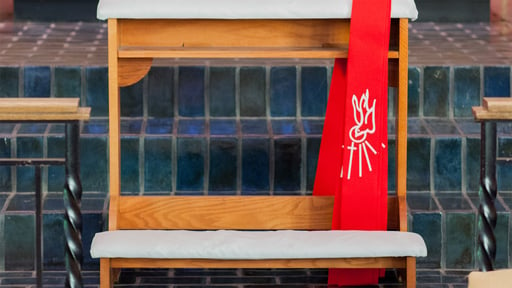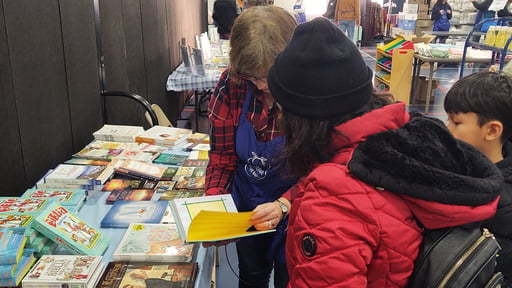Starting in 2006 and marking its fifteenth anniversary this year, World Down Syndrome Day, March 21, is the day we celebrate the unique and precious blessing of individuals in our lives with Down syndrome. Down syndrome, or trisomy 21, means there is an extra (third) chromosome in the twenty-first chromosomal pair of a person’s genetic makeup.
March 21 is also a day that has become significant in my household. Our family has marked this commemoration every year for the past eight years—that’s how old our first daughter is. She was born with Down syndrome. Although many medical challenges and developmental uncertainties have colored her life to this point, our daughter is absolutely worth celebrating. God made her with the same loving care and intimate devotion He gives to all of His children. For that, I thankfully praise Him.
In response to the gift that is our daughter, my husband and I train her up in the faith. God gives her the same eternal salvation He gives all His children. She, too, is precious in His sight. It is our duty as her parents to teach her how precious all the Lord’s promises are as well.
Train Up a Child
As any parent can attest, teaching the faith to our children poses challenges. When developmental disabilities enter the equation, the challenges tend to increase in some ways. In other ways, teaching becomes simplified. The more abstract concepts and reasoning may be out of our grasp at the moment with our daughter, but regardless, God commands us to teach His Word diligently to our children (Deuteronomy 6:7). The practice of homologeo, which means “to say the same thing” (usually in the context of echoing God’s Word back to Him), is a skill that our girl has been cultivating ever since she could speak.
In the preface to the Small Catechism, Luther says:
But when you preach in the presence of learned and intelligent people, you may show your skill. You may present these parts in as varied and intricate ways and give them as masterly turns as you are able. But with the young people stick to one fixed, permanent form and manner. Teach them, first of all, these parts: the Ten Commandments, the Creed, the Lord’s Prayer, and so on, according to the text, word for word, so that they, too, can repeat it in the same way after you and commit it to memory.This guidance for young people applies to children with developmental disabilities too. Our daughter knows Luther’s Evening Prayer and repeats each phrase after us at bedtime. She sings the Lord’s Prayer with us every night and recites it in church every Sunday. Through her participation in the Divine Service, she has begun saying many parts of the liturgy along with the rest of the congregation.
She doesn’t have much verbal clarity yet, but one thing rings out clear and unmistakable when she says it: amen. She says her amens so big and cheerfully—and with the biggest grin on her face. Our daughter does absorb all this teaching. She may not have the ability to articulate her faith, but through her homologeo and because of her Baptism, we know faith lives in her. Thanks be to God!
In the Way He or She Should Go
Here are some things we do that have helped pass the faith along to our daughter:
- Pray together, especially using the same prayers over and again. We use the Common Table Prayer, Luther’s Evening Prayer, and the Lord’s Prayer daily. Incorporating repetitive physical movements with the rhythm of the prayers is also helpful—and fun!
- Attend church (now that many congregations have returned to in-person services) and participate in the church service boldly. Even when our daughter escapes the pew to sprint for the altar or shouts, “Hi, Papa!” when her father (our pastor) begins the sermon, it’s good for her to be there. It is also good for the congregation to see her participation in the practices of our faith.
- Fill our home with music that glorifies God. Our daughter loves music. We like to play Lutheran Public Radio from our smart speaker.
- Read the Bible together, especially in an engaging format. Our daughter received The Story Bible from her baptismal sponsors when she was born, and it has been “loved” to the point of needing replacement!
If you are the parent of a child with developmental disabilities, I hope you find a little solidarity or a little helpful information in reading this. If you are not, I hope you’ll still take something away, whether that be a reminder of our vocation to share the Gospel with all the world or the importance of bringing your family together around the Word of the Lord in church.
And I hope we can all remember the community of people with Down syndrome on this day, celebrate their existence, assist in the development of their faith, and hold them in prayer—our fellow children of God.
Happy World Down Syndrome Day!
Small Catechism quotation is from Luther’s Small Catechism, copyright © 1986 Concordia Publishing House. All rights reserved.
Learn more tips for parenting children with special needs in this free download.






.jpg?width=50&height=50&name=IMG_20220621_160541_456%20(1).jpg)







